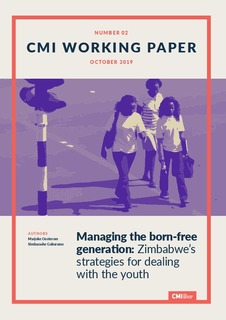Managing the born-free generation: Zimbabwe’s strategies for dealing with the youth
Working paper
Permanent lenke
http://hdl.handle.net/11250/2625653Utgivelsesdato
2019-10-01Metadata
Vis full innførselSamlinger
- Publications [1488]
Originalversjon
Bergen: Chr. Michelsen Institute (CMI Working Paper WP 2019:02)Sammendrag
A rich literature on Africa’s autocratic and repressive regimes has discussed the diverse strategies through which these regimes seek to consolidate and stay in power. Prominent strategies include election rigging, extensive patronage, corruption, the use of decentralised or federal governance systems, limiting political and civic freedoms through restrictive legislation, election violence and forms of surveillance and intimidation to crack down any form of dissent and protest, and promoting a culture of fear and discourses that delegitimise dissenting voices (Aalen & Muriaas 20180; Ghandi & Lust-Okar 2009; Hodzi 2014; Hossain, Nalini, Mohmand, Nazneen, Oosterom, Roberts, Santos, Shankland, & Schroeder 2018; Schedler 2013). As part of a research project on youth in authoritarian regimes, this working paper explores the proposition that the ways that regimes deal with this urban youth population is a strategy for holding on to power. While it is known that regimes that have large youth populations are more likely to use repression that other regimes (Nordas & Davenport 2013), this paper discusses how the relationship between the Government of Zimbabwe, the ruling party and the country’s youth population has developed over time and examines the strategies used by the government and ruling party to include, exclude and repress the youth.
